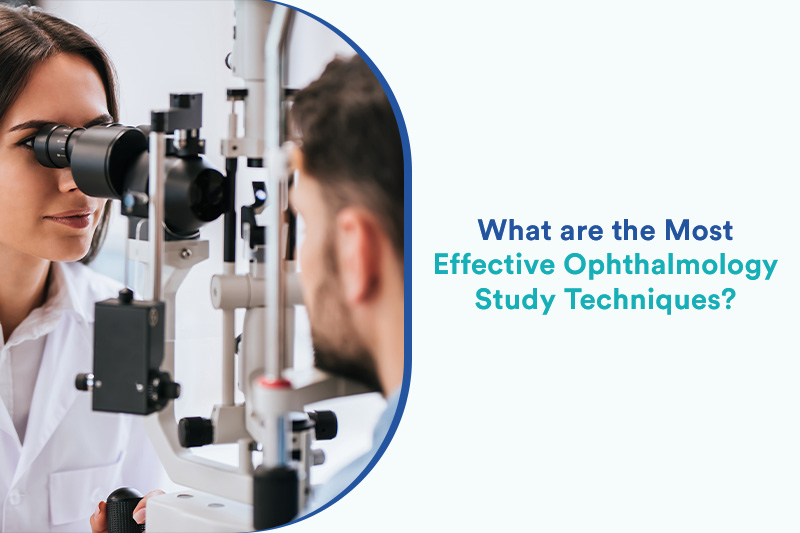
Students enrolled in the MD Ophthalmology course receive advanced instruction and training in a variety of procedures, from carrying out necessary eye surgery to prescribing eyeglasses and contact lenses. The course is well structured for doctors to address any eye issues that may arise in the human body. It covers the fundamentals of ophthalmology as well as more complex topics such as disorders of the optical nerve system and the uvea and vitreoretinal tissues. Doctors are educated on how to treat eyes in accordance with assessments acquired with the use of medicine, surgery, nutrition, and other therapies. The curriculum is developed to equip enrolled doctors with the knowledge and skills necessary to provide total eye care, including vision services, eye examinations, medical and surgical eye procedures, and diagnosing and treating eye disorders and other visual difficulties.
Strategic approach to study Ophthalmology MD
Students have a lot to cover during MBBS, hence it’s highly advised to adopt the most suitable tips and tricks to study ophthalmology along with other MBBS subjects. Some of the greatest study techniques that aid in information retention include:
- Record your lessons in writing & revisit notes frequently
- Take mock tests regularly
- Establish a positive learning atmosphere
- Use mnemonics to remember concepts better
- Make use of audio and visual techniques
- Think about starting a study group
- Join online groups for regular updates
- Solve MCQs after the completion of each topic
- Watch online MBBS video lectures on high-yield topics
Let us now take a deep dive into some specific and tactical strategies that can help you with PG Ophthalmology:
- Intradepartmental and interdepartmental meetings, seminars, symposia, and lecture demonstrations all call for active student participation. You learn about recent breakthroughs by taking part in symposia, CMEs, and journal clubs. Hence, you will be better able to concentrate on the purpose, approaches, comments, exchanges, and conclusions.
- By participating in as many clinical case discussions as possible, you should acquire clinical training. You will improve your ability to diagnose and make decisions through case discussions based on patient records that you have noted. You ought to take part in conversations and presentations in a variety of ways. You will benefit from using a problem-oriented strategy to aid in decision-making.
- You should not be afraid to interact with your seniors before presenting at the symposium. By taking part in these discussions, your seniors can get you ready for speaking in front of a larger audience.
- In order to determine the influence on patient management, you should engage in bedside dialogues during rounds and outpatient instruction. You should be interested in the case studies presented by consultants since they assist in solving difficult problems and offer a platform for the discussion of intriguing situations. Participating in the training sessions of interns and undergraduate students will help you brush up on your knowledge.
Along with the aforementioned, you may want to enroll in the Ophthalmology MD Course, which is one of the best PG Ophthalmology courses, developed by Dr. N. Venkatesh Prajna, and India’s top 55 faculty members. It is a thoughtfully compiled collection of lessons from prominent ophthalmologists from across the nation. There are almost 400 topics included in this comprehensive course, all of which are significant from an academic, clinical, and surgical perspective. All of the course’s topics have been carefully designed, with consideration given to frequently asked questions and troublesome areas for postgraduate students.
This course is perfect for students who want to succeed after graduation. The course’s components, which aid students in practicing surgical techniques and even managing post-operative difficulties, appropriately address their needs throughout the pre-operative workup. In order to meet all of the students’ learning needs, it promotes the concept and approach-based learning.
Postgraduate students who are taking exams have a special portion with an innovative exam corner section. Precise case and history-taking techniques must be used to acquire the correct clinical findings for commonly occurring ocular illnesses. With the use of surgical videos combined with 3D animated sequences of every surgical step, practitioners could also develop clinical and surgical ophthalmic skills. The course further includes video lectures, lecture notes, a checklist, an examination corner section, self-assessment questions, an interactive drug formulary, and chat shows.
While developing strong study habits is crucial, remember to integrate breaks into your schedule regularly so you have time to refresh. You can feel confident about setting yourself up for a prosperous future now that you are more aware of how to prepare for Ophthalmology.



